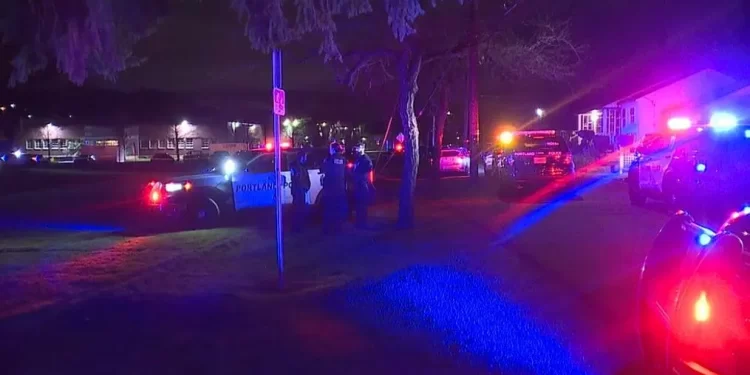Portland, OR — A Portland woman has been charged with attempted murder, assault, and firearm-related offenses after allegedly shooting a 17-year-old boy in the leg at an apartment complex on December 6. Natasha Molett, 37, pleaded not guilty to the charges during her arraignment on Monday.
The shooting incident, which occurred near North Sumner Street and Vancouver Avenue, has raised serious concerns about the Portland Police Bureau’s response to earlier reports of harassment and threats made by Molett toward her neighbors.
According to Shaelynn Fuller, who lives in the apartment beneath Molett, the shooting did not come without warning. Fuller claims that Molett had threatened her in August, shouting outside her apartment, “This [expletive] is about to get shot.” Fuller said she captured the threats on her home surveillance cameras and filed multiple police reports in an effort to document the escalating behavior. However, Fuller alleges that nothing was done to address the situation.
Fuller also shared additional footage showing Molett banging on her windows and yelling at her, as well as other incidents of harassment. Despite the alarming nature of these interactions, she said that police failed to take action, leaving her feeling helpless and frustrated.
“It’s really frustrating that it got to this point and somebody else got hurt,” Fuller told reporters. “I did everything I could, and it’s unacceptable that my kids are scared to be home.”
Fuller provided these videos and reports to the Portland Police, but a spokesperson for the police department later acknowledged that not all of her reports were sent to the Multnomah County District Attorney’s Office. “Two of the reports were filed by the complainant in order to create a paper trail. The third was a noise complaint,” the spokesperson explained.
The evening of December 6, police say Molett was seen on surveillance video following a 17-year-old boy as he walked his two dogs near the apartment complex. Molett, who was reportedly holding a beer bottle at the time, allegedly shouted at the teenager and then shot him multiple times in the legs. Neighbors’ surveillance footage captured the sound of gunshots and Molett running back to her apartment shortly after the incident.
According to police, the victim was able to call for help and was transported to the hospital with gunshot wounds to his leg. In an interview with police at the hospital, the victim described Molett as confrontational. He said he initially ignored her when she called out to him, assuming she was asking about his dog. However, when he turned around, he saw Molett holding a firearm, which he initially mistook for a blue gun, before she allegedly shot him twice, breaking his leg.
Molett, a convicted felon, has a criminal history that includes prior convictions in 2017 and 2018. Police reports indicate that she was prohibited from possessing firearms due to her felony record. The charges against her now include attempted murder, assault, felon in possession of a firearm, and unlawful use of a weapon.
In addition to the charges stemming from the shooting, the case has drawn attention to the Portland Police Bureau’s handling of the previous reports filed by Fuller. Despite Fuller’s documented efforts to alert authorities, there appears to have been little follow-up on her claims of harassment, which now raises questions about the department’s accountability.
Fuller expressed deep frustration, saying that her attempts to protect her family seemed to fall on deaf ears. “My 3-year-old says, ‘Mom, I don’t want to go home. The neighbor’s scary,’” she said, recounting the toll the situation has taken on her children.
Molett is scheduled to return to court on December 17 for further proceedings. Meanwhile, the 17-year-old victim is recovering from his injuries, though his leg was severely damaged in the attack.
The case has prompted renewed scrutiny of how local law enforcement handles reports of threats and harassment, particularly in cases where there is a history of violence. Fuller’s experience has raised concerns about the adequacy of police responses when residents take the time to document potentially dangerous behavior.
As the legal process unfolds, both the Portland Police Bureau and the Multnomah County District Attorney’s Office will likely face questions about their handling of this case, especially regarding the failure to act on earlier reports of threats and harassment. The outcome of this case may have lasting implications for how authorities respond to community concerns about safety and accountability in Portland.














